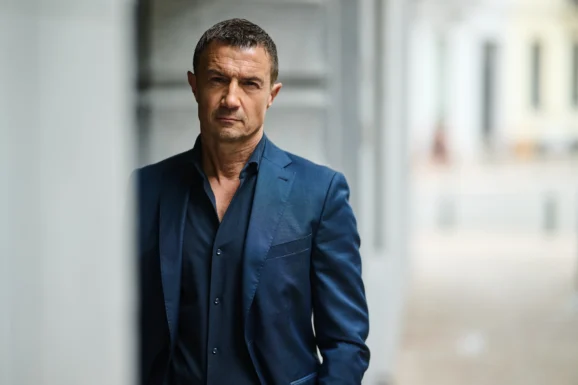Curium’s expansion into transformative therapy offers fresh hope against cancer

John E. Kaye
- Published
- Science, Technology

Increased radioligand therapy options could transform cancer treatment by targeting tumours while reducing exposure to surrounding healthy tissue. Curium, a global leader in nuclear medicine, is moving to roll it out worldwide
Therapy that delivers radiation directly to cancer cells promises to transform treatment for patients around the globe.
Radioligand therapy, now being developed by nuclear medicine company Curium, has shown encouraging results in clinical trials so far.
This treatment is designed to target cancer cells directly, with less exposure to surrounding healthy tissue with less severe side effects than those typically associated with chemotherapy and external radiotherapy.
Early trial reports suggest that some patients may experience longer survival, reduced pain and improved quality of life.
Renaud Dehareng, the CEO of Curium Group, which has European headquarters in Paris, said the company’s focus is on building on its nuclear medicine expertise to deliver new treatments.

He said: “Our mission is to find innovative ways to diagnose and treat cancer to improve the lives of patients.
“We are reinvesting all our profits from our established business into expanding diagnostics and into research and development, and now have a pipeline of targeted radionuclide therapies for specific tumour types.
“Our aim is to develop these therapies to treat cancer over the next 15 years.”
The technique works by attaching a radioactive isotope to a molecule engineered to bind to tumours. Once attached to the receptors on the cancer cell, the isotope delivers a lethal dose of radiation that damages it from within.
Unlike chemotherapy or external beam radiation, which exposes the body to toxic treatment, radioligand therapy is designed to act with precision, targeting the tumour and minimising the impact on healthy cells surrounding it.
Radioligand therapy is currently marketed for certain cancers, but Curium is now aiming to expand its reach by developing treatments for common tumour types such as advanced prostate cancers, while also exploring earlier use alongside existing standards of care.
According to the latest global statistics, prostate cancer alone is responsible for almost 400,000 deaths worldwide each year.
Curium has expressed an aspiration to broaden the use of radioligand therapy, potentially applying it to 80 per cent of cancers over the next two decades.
The company has long supplied isotopes and radiopharmaceuticals for hospital imaging, producing materials for millions of PET and SPECT scans each year. It now argues that the same expertise can support its therapeutic ambitions.
Analysts forecast the global market for radiopharmaceuticals could exceed €35bn by 2033. Curium says its established production network gives it the scale to deliver treatments at volume once approved, describing its approach as spanning “from proton to patient”. It says the ability to deliver therapies to millions of patients worldwide will be critical, given their short shelf-life.
Regulators are already moving quickly to support development, and demand from the medical community is growing.
Dehareng said: “No current single treatment will replace surgery, chemotherapy or radiotherapy, but radioligand therapy has the potential to be one of the most significant advances in oncology in decades.
“For patients with advanced cancers, it could offer them more time and with fewer side effects compared to existing options. For the wider field, it represents an important step towards more targeted and personalised treatment.”
Further information
Produced with support from Curium. To find out more about its research into radioligand therapies, visit www.curiumpharma.com
Read More: ‘Watch: Curium’s bold vision to treat up to 80% of cancers within 15 years‘. In an exclusive interview with The European’s Juliette Foster, Curium Group CEO Renaud Dehareng outlines his plan to treat up to 80% of cancers within the next few decades, explains how theranostics is reshaping oncology, and shares why the Boston-based company is now ready to step into the global spotlight.
Do you have news to share or expertise to contribute? The European welcomes insights from business leaders and sector specialists. Get in touch with our editorial team to find out more.
RECENT ARTICLES
-
 Abu Dhabi to build first Harry Potter land featuring both Hogwarts Castle and Diagon Alley
Abu Dhabi to build first Harry Potter land featuring both Hogwarts Castle and Diagon Alley -
 Could AI finally mean fewer potholes? Swedish firm expands road-scanning technology across three continents
Could AI finally mean fewer potholes? Swedish firm expands road-scanning technology across three continents -
 BrewDog collapses into administration as US cannabis group Tilray buys UK business for £33m
BrewDog collapses into administration as US cannabis group Tilray buys UK business for £33m -
 Government consults on social media ban for under-16s and potential overnight curfews
Government consults on social media ban for under-16s and potential overnight curfews -
 Twitter co-founder Jack Dorsey cuts nearly half of Block staff, says AI is changing how the company operates
Twitter co-founder Jack Dorsey cuts nearly half of Block staff, says AI is changing how the company operates -
 Brisbane named world’s best city to raise a family, with London second
Brisbane named world’s best city to raise a family, with London second -
 Hornby sells iconic British slot-car brand Scalextric for £20m
Hornby sells iconic British slot-car brand Scalextric for £20m -
 WPSL targets £16m-plus in global sponsorship drive with five-year SGI partnership
WPSL targets £16m-plus in global sponsorship drive with five-year SGI partnership -
 Dubai office values reportedly double to AED 13.1bn amid supply shortfall
Dubai office values reportedly double to AED 13.1bn amid supply shortfall -
 €60m Lisbon golf-resort scheme tests depth of Portugal’s upper-tier housing demand
€60m Lisbon golf-resort scheme tests depth of Portugal’s upper-tier housing demand -
 2026 Winter Olympics close in Verona as Norway dominates medal table
2026 Winter Olympics close in Verona as Norway dominates medal table -
 Europe’s leading defence powers launch joint drone and autonomous systems programme
Europe’s leading defence powers launch joint drone and autonomous systems programme -
 Euro-zone business activity accelerates as manufacturing returns to expansion
Euro-zone business activity accelerates as manufacturing returns to expansion -
 Deepfake celebrity ads drive new wave of investment scams
Deepfake celebrity ads drive new wave of investment scams -
 WATCH: Red Bull pilot lands plane on moving freight train in aviation first
WATCH: Red Bull pilot lands plane on moving freight train in aviation first -
 Europe eyes Australia-style social media crackdown for children
Europe eyes Australia-style social media crackdown for children -
 These European hotels have just been named Five-Star in Forbes Travel Guide’s 2026 awards
These European hotels have just been named Five-Star in Forbes Travel Guide’s 2026 awards -
 McDonald’s Valentine’s ‘McNugget Caviar’ giveaway sells out within minutes
McDonald’s Valentine’s ‘McNugget Caviar’ giveaway sells out within minutes -
 Europe opens NanoIC pilot line to design the computer chips of the 2030s
Europe opens NanoIC pilot line to design the computer chips of the 2030s -
 Zanzibar’s tourism boom ‘exposes new investment opportunities beyond hotels’
Zanzibar’s tourism boom ‘exposes new investment opportunities beyond hotels’ -
 Gen Z set to make up 34% of global workforce by 2034, new report says
Gen Z set to make up 34% of global workforce by 2034, new report says -
 The ideas and discoveries reshaping our future: Science Matters Volume 3, out now
The ideas and discoveries reshaping our future: Science Matters Volume 3, out now -
 Lasers finally unlock mystery of Charles Darwin’s specimen jars
Lasers finally unlock mystery of Charles Darwin’s specimen jars -
 Strong ESG records help firms take R&D global, study finds
Strong ESG records help firms take R&D global, study finds -
 European Commission issues new cancer prevention guidance as EU records 2.7m cases in a year
European Commission issues new cancer prevention guidance as EU records 2.7m cases in a year



























